Germany team UEFA EURO 2024
Composition of the German team
Goalkeepers: Manuel Neuer, Oliver Baumann, Marc-André ter Stegen
Defenders: Waldemar Anton, Maximilian Mittelstädt, Benjamin Henrichs, David Raum, Joshua Kimmich, Robin Koch, Antonio Rüdiger, Nico Schlotterbeck, Jonathan Tah
Midfielders: Robert Andrich, Florian Wirtz, Chris Führich, Pascal Groß, İlkay Gündoğan, Toni Kroos, Jamal Musiala, Leroy Sané, Alexander Pavlovic
Forwards: Maximilian Beier, Niclas Füllkrug, Kai Havertz, Thomas Müller, Deniz Undav.
History of the German football team
The German national football team, often referred to as “The Team”, has a long and successful history dating back to the late 19th century. The national team is known for its discipline, tactical versatility and notable successes in major tournaments. Let’s take a look at the most important milestones and developments in the history of the German national team.
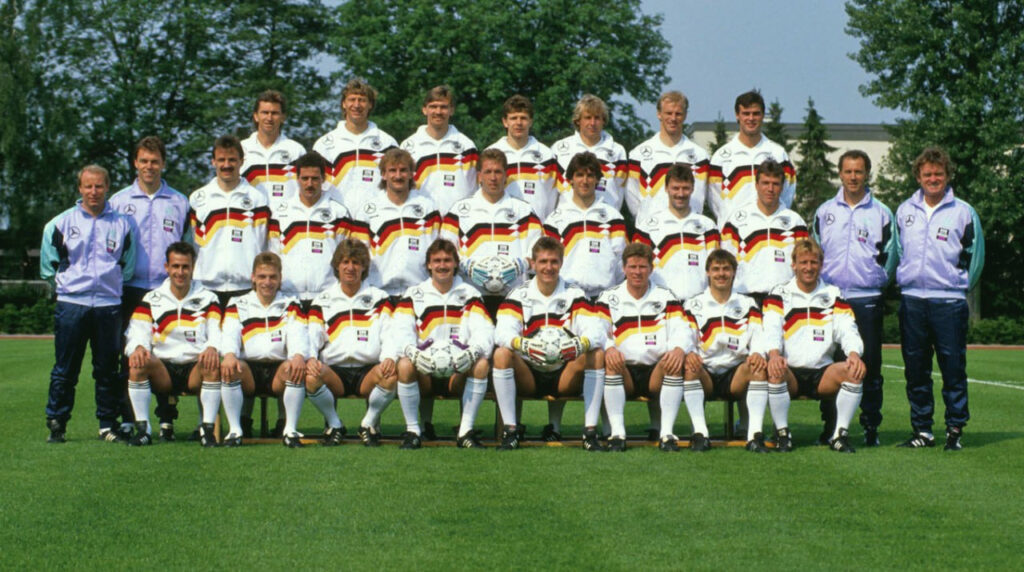
Early years and first titles
The German national team played its first official game in 1908 against Switzerland. The early years were characterized by sporadic international appearances and modest success. Participation in the first FIFA World Cup tournament in 1930 was skipped, but in 1934 Germany reached the semi-finals and finished in third place. The first major success came in 1954 when the team won the World Cup in Switzerland in the so-called “Miracle of Bern”.
Era of stability and success
In the 1970s, the German national team established itself as one of the best in the world. Under the leadership of coach Helmut Schön, Germany won the 1974 World Cup on home soil. The iconic captain Franz Beckenbauer led the team in this tournament. This era also saw Germany win the 1972 and 1980 European Championships, cementing the team’s status as one of the premier football nations.
Beckenbauer and the second miracle
Franz Beckenbauer took over as coach in the 1980s and he led Germany to another World Cup title in Italy in 1990. This was a historic moment as Germany was still divided at the time and the World Cup award ceremony had strong symbolism. The 1990 victory, in which Germany beat Argentina in the final, marked the beginning of a new era for German football.
Reunification and new Germany
After the reunification of Germany in 1990, a new era began for the German national team. The team had to adapt to the changes and find a new balance. The team experienced both ups and downs in the 1990s, but managed to win the European Championship in 1996.
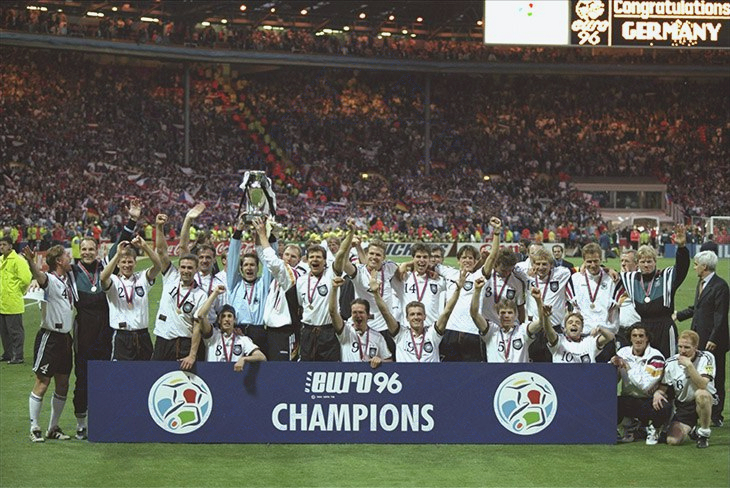
Modern era and home World Cup 2006
In the 2000s, the German national team experienced a phase of restructuring and renewal. The team was preparing to successfully host the home World Cup. The legendary Jürgen Klinsmann became the coach, relying on a younger generation of players and a more offensive style of play.
One of the key moments of the tournament was that Germany welcomed world football with open arms. There was a football atmosphere across the country, attracting millions of fans from all over the world. This was a unique opportunity for Germany to demonstrate its hospitality and love for football.
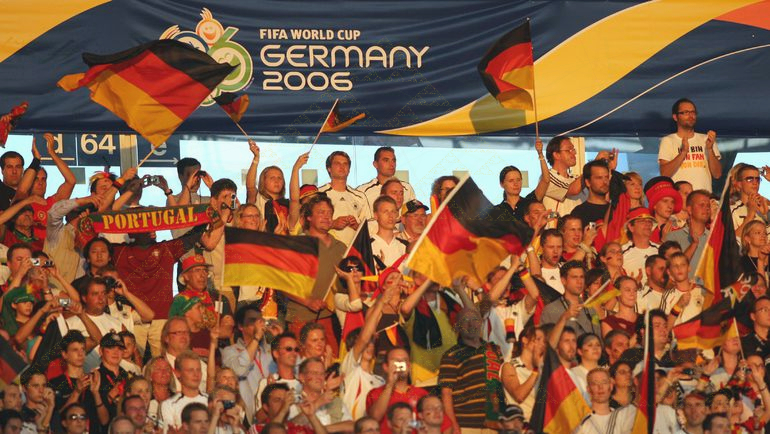
The German national team, led by Jürgen Klinsmann, had a strong squad that included both experienced players and promising young talents. The team played attacking football and put on a spectacular performance that filled the stadiums. Particular attention was paid to stars such as Miroslav Klose, Lukas Podolski and Michael Ballack.
Despite a semi-final defeat to the eventual Coppa Italia winners, Germany managed to convincingly defeat Portugal in the third place match, resulting in a positive end to the tournament for German fans. The 2006 World Cup in Germany is remembered as a football festival that inspired millions of people around the world. It was a tournament that demonstrated the power and passion of football and united the entire nation in the pursuit of success.
Reaching the final of the 2008 European Championships
The German national team showed an astonishing level of play at the 2008 European Football Championship and once again confirmed its status as one of the strongest teams on the continent. This tournament was another milestone in the history of German football, demonstrating strength, discipline and the ability to achieve results.
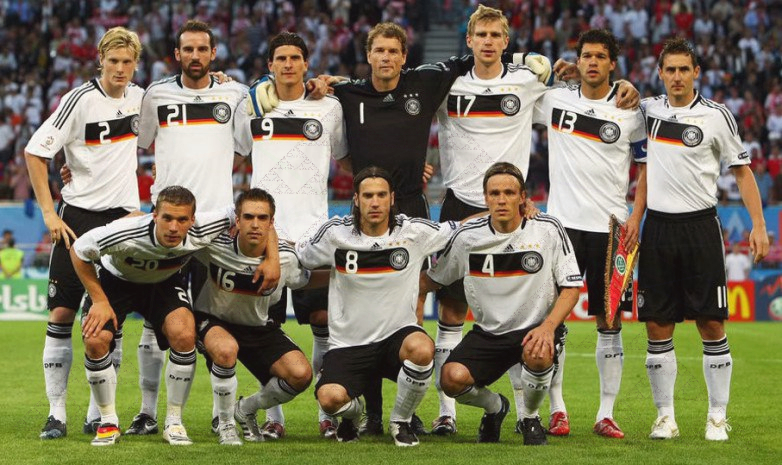
The German coach at the time was Joachim Löw, who took over the team in 2006 after the departure of Jürgen Klinsmann. Under his leadership, the national team received new impetus, became more offensive and creative, without losing the traditional German organization.
In the final, Germany faced a Spanish team at the peak of their abilities. Despite the German team’s best efforts, the Spaniards were too strong and Germany lost 1-0. Despite defeat in the final, Germany’s performance at Euro 2008 was impressive and an important milestone on the road to future success. The team has shown that it is ready to perform at its best and has secured its status as one of the main forces in European football.
Fourth world championship title
The 2014 World Cup was a triumph for the German national team and cemented their status as one of the leading football giants. Under the leadership of coach Joachim Löw, the German team demonstrated an outstanding combination of individual skill, unity and tactical flexibility.
It was already clear in the group phase that Germany wanted to fight for the title. In the first game, when they beat Portugal 4-0, the Germans showed their strength and confidence. Thomas Müller, who soon became one of the main heroes of the tournament, scored a hat trick and sent a signal to the rest of the teams.
Throughout the tournament, Germany displayed unique tactics based on ball control, quick passing and deep formations. Even against strong opponents like France and Brazil, the German team managed to maintain its composure and strategy.
However, the semi-final against Brazil went down in history as one of the most unexpected games of all time.
In front of a shocked Brazilian crowd, Germany scored seven goals, leaving the hosts only able to respond with one. It wasn’t just a defeat, it was a demonstration of team spirit, precise passing and composure in front of goal. Many saw the game as a symbol of the transition of eras: German football, based on strict discipline and tactics, clearly surpassed Brazilian creativity and improvisation.
The last game against Argentina, however, was a test of endurance and patience. Both teams played cautiously under high pressure, knowing full well that the World Cup title was at stake. The decisive moment came in extra time when substitute Mario Götze secured Germany’s fourth world championship title with a great goal.
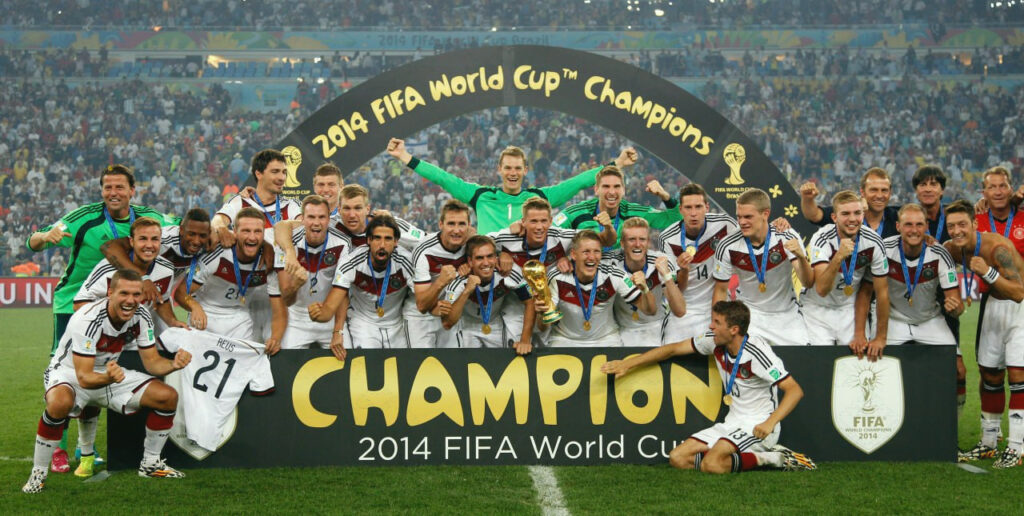
Germany’s victory at the 2014 World Cup was not only the result of excellent performances on the field, but also the result of systematic work on the development of football infrastructure in the country. The German youth training system, attention to detail and emphasis on teamwork became the basis of success. This triumph inspired new generations of footballers around the world and strengthened Germany’s reputation as one of the world’s most important football centers.
The present and future
The last few years have shown the German national team’s changeable game. After success in 2014, there were setbacks, including a disappointing group stage exit from the 2018 World Cup. However, Germany remains one of the leading football nations and with new talent and fresh ideas, the team is optimistic about the future.
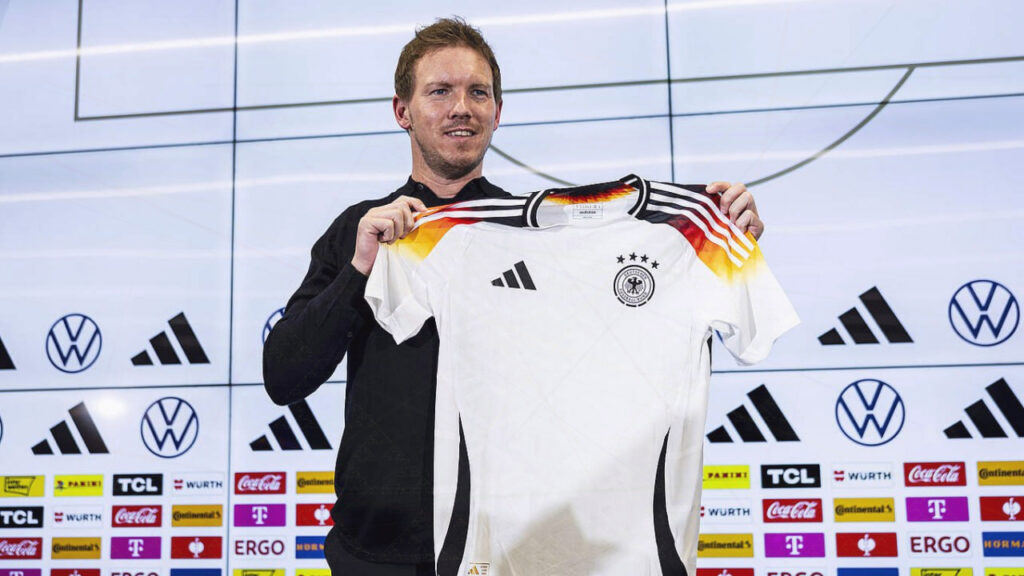
As Germany’s head coach ahead of Euro 2024, Julian Nagelsmann is one of the most exciting and promising figures in world football. Despite his relatively young age for a coach, Nagelsmann has already established himself as a creative, courageous and intelligent specialist.
Nagelsmann is ambitious and motivated to be successful at the highest level. His appointment ahead of the 2024 European Championship shows the German Football Association’s desire to bring the national team back to greatness.
Ultimately, Julian Nagelsmann is the coach who can give the German national team new impetus and combine tradition with innovation. His approach to Euro 2024 will be one of the most interesting aspects of the upcoming tournament.
